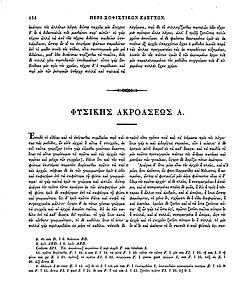
The works of Aristotle, sometimes referred to by modern scholars with the Latin phrase Corpus Aristotelicum, is the collection of Aristotle's works that have survived from antiquity.
According to a distinction that originates with Aristotle himself,[citation needed] his writings are divisible into two groups: the "exoteric" and the "esoteric".[1] Most scholars have understood this as a distinction between works Aristotle intended for the public (exoteric), and the more technical works intended for use within the Lyceum (esoteric).[2] Modern scholars commonly assume these latter to be Aristotle's own (unpolished) lecture notes (or in some cases possible notes by his students).[3] However, one classic scholar offers an alternative interpretation. The 5th century neoplatonist Ammonius Hermiae writes that Aristotle's writing style is deliberately obscurantist so that "good people may for that reason stretch their mind even more, whereas empty minds that are lost through carelessness will be put to flight by the obscurity when they encounter sentences like these."[4]
Not all of these works are considered genuine, but differ with respect to their connection to Aristotle, his associates and his views. Some are regarded by most scholars as products of Aristotle's "school" and compiled under his direction or supervision. Other works, such as On Colors, may have been products of Aristotle's successors at the Lyceum, e.g., Theophrastus and Strato of Lampsacus. Still others acquired Aristotle's name through similarities in doctrine or content, such as the De Plantis, possibly by Nicolaus of Damascus. A final category, omitted here, includes medieval palmistries, astrological and magical texts whose connection to Aristotle is purely fanciful and self-promotional.
In several of the treatises, there are references to other works in the corpus. Based on such references, some scholars have suggested a possible chronological order for a number of Aristotle's writings. W. D. Ross, for instance, suggested the following broad chronology (which of course leaves out much): Categories, Topics, Sophistici Elenchi, Analytics, Metaphysics Δ, the physical works, the Ethics, and the rest of the Metaphysics.[5] Many modern scholars however, based simply on lack of evidence, are skeptical of such attempts to determine the chronological order of Aristotle's writings.[6]
- ^ Barnes 1995, p. 12; Aristotle himself: Nicomachean Ethics 1102a26–27. Aristotle himself never uses the term "esoteric" or "acroamatic". For other passages where Aristotle speaks of exōterikoi logoi, see W. D. Ross, Aristotle's Metaphysics (1953), vol. 2, pp. 408–410. Ross defends an interpretation according to which the phrase, at least in Aristotle's own works, usually refers generally to "discussions not peculiar to the Peripatetic school", rather than to specific works of Aristotle's own.
- ^ House, Humphry (1956). Aristotles Poetics. p. 35.
- ^ Barnes 1995, p. 12.
- ^ Ammonius (1991). On Aristotle's Categories. Ithaca, NY: Cornell University Press. ISBN 0-8014-2688-X. p. 15
- ^ W. D. Ross, Aristotle's Metaphysics (1953), vol. 1, p. lxxxii. By the "physical works", Ross means the Physics, On the Heavens, On Generation and Corruption, and the Meteorology; see Ross, Aristotle's Physics (1936), p. 3.
- ^ E.g., Barnes 1995, pp. 18–22.